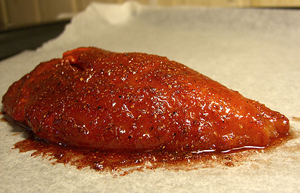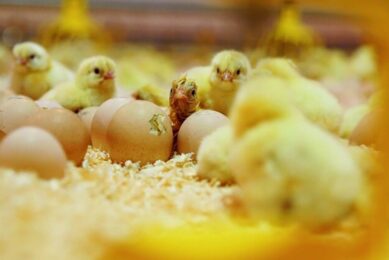Research: Frozen breast fillets show better marinade pick-up

In a research program at Auburn University in Auburn, AL USA, the rate of marinade pick-up and retention in frozen versus fresh breast fillets was determined, in addition to differences in cook-loss between the treatments.
Broilers (Ross 708, 7 wks of age) were conventionally processed and chilled for 24 hours. Butterfly breasts were deboned and split with the right fillet (control) being marinated fresh, and the left fillets were frozen (37 d, −20°C), thawed (4°C for 48 h) and marinated.
Additionally, fresh fillets and previously frozen fillets were tumble marinated at two different temperatures 7.2°C and 18.3°C (n = 40 fillets per treatment per replicate). Two replicates were conducted. Green weights were recorded as a group for the 15 fillets added to each tumbler with eight tumblers per treatment. A marinade solution (water, 0.45% phosphate and 1.4% salt) with a 15% target pick-up was added to each tumbler.
Each batch was tumbled for 30 min. The fillets were removed from the tumbler, and a batch weight was recorded to calculate marinade uptake. The fillets were then placed in bags by treatment and stored on ice overnight. The following day, they were removed from bags and weighed to calculate marinade retention. To determine cook-loss, fillets were cooked in foil covered pans with wire racks to an internal temperature of 73.8°C, cooled and weighed.
Results suggested that the previously frozen and marinated fillets at 18.3°C had the highest marinade pick-up of all the treatments, whereas the fresh marinated fillets at 18.3°C had the lowest pick-up. Likewise, the previously frozen and marinated fillets at 18.3°C had the highest marinade retention compared with the fresh marinated fillets at 18.3°C which had the lowest marinade retention.
In addition, fresh marinated fillets at 18.3°C had the highest cook-loss while the previously frozen and marinated fillets at 7.2°C had the lowest cook-loss. This data suggests previously frozen fillets may pick-up and retain marinade and have the lowest cook-loss, however, there is loss associated with freeze-thaw.
Source: www.auburn.edu
Join 31,000+ subscribers
Subscribe to our newsletter to stay updated about all the need-to-know content in the poultry sector, three times a week. Beheer
Beheer











 WP Admin
WP Admin  Bewerk bericht
Bewerk bericht